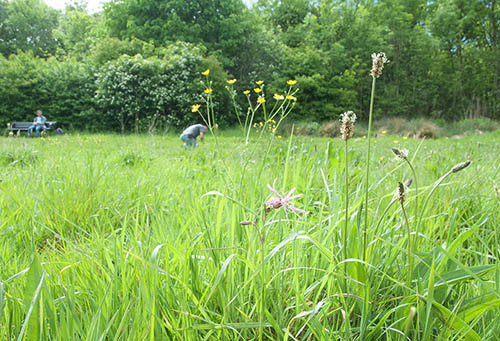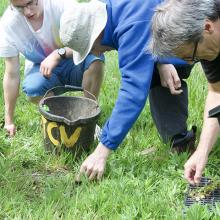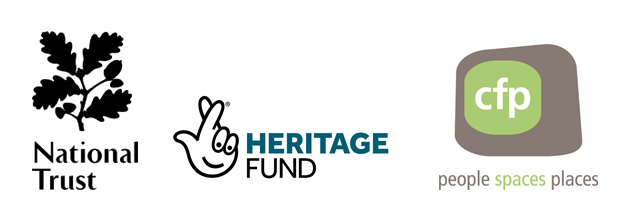The COVID-19 pandemic has had an extensive impact on the parks service at Plymouth City Council. It is forecast that the total annual loss of external income will be £200,000 and up to 966 volunteer hours will be lost but the situation has accelerated plans to improve biodiversity.
Local context
Plymouth City Council is a unitary authority in the south-west and is home to around 262,700 people. It has 23 formal parks and many green spaces, with 9.4 million visits1 to its parks and green spaces per year. The council’s park service has 58 members of staff and the service falls under the council’s wider Street Services department, which also covers street cleansing and waste management. An active and valued community of 69 regular volunteers contribute to the parks service.
Council’s response
Service delivery and staffing have been impacted by the pandemic as the parks service immediately lost 20 per cent of their workforce (those in the vulnerable category) and many staff were initially redeployed across the wider Street Scene department to assist with street cleansing, waste management and cemeteries (a further 20 per cent loss). The forecast cost of staff redeployment averages £5,400 per month - note: this is an internal accounting cost at department level. Grass cutting regimes were affected the most however bowling green maintenance and sport pitch cutting continued as it would inevitably cost more to maintain the conditions in the future if this ceased. There was however a need for increased maintenance on parks and Local Nature Reserves due to increased use / a more consistent use throughout the week. Tree work was reduced to safety critical work but resumed to ‘normal’ service in June 2020 and all community engagement moved online.
All parks and open spaces remained open but facilities have been closed, locked off where possible and signage erected as per government guidance. Car parks to key beauty spots were also closed. The council faced some issues at the skate park in Central Park and with dogs not being on leads despite signage and advice. To deal with this the council spent a number of weeks in close dialogue with their silver tactical command group, the police and the local enforcement team (both services had limited capacity to deal with the two issues to any great extent), and installed signage on site in line with government guidance. Messages were also sent out to the wider public through the corporate communications team to encourage behaviour in line with the guidance. There were also discussions with portfolio holders on a regular basis about such situations.
The parks team have not been involved in enforcement activity as this has been led by police. Throughout the lockdown period there was a lot of dialogue with the police and the council resisted multiple requests to tape off benches and fence skate parks or fill with sand. This decision was taken as the requests were not deemed to be proportionate or reasonably practicable control measures to the risk and it was felt that taping benches and fencing would not be effective as it was anticipated that these measures would be breached or damaged in a very short space of time, introducing further risk to site users and additional maintenance requirement and risk to staff.
| Sources of income | % |
|---|---|
| Core council funding | 48.2 |
| External income | 13.3 |
| Internal income - other departments / services | 36.6 |
| Planning including s106/CIL | 1.8 |
The parks service is following the corporate procedure with regard to a phased reopening of facilities, all of which is subject to a Risk and Equality Impact Assessment requiring increased administration. Outdoor sports facilities (tennis, bowls, skate parks, pitch and putt) opened and some cafes resumed take away service in line with government guidance. Toilets remain closed throughout June however coin operated WCs have remained open throughout and an enhanced cleansing regime were put in place for these.
Throughout the crisis the communications team have been running a scaled up campaign encouraging individuals and volunteers to participate in Citizen Science projects including monitoring wildflower meadow species and biodiversity. A campaign focused on grass cutting and biodiversity/climate emergency was also launched which will run to August.
Financial impact
The total annual parks service net budget for 2020-21 pre-COVID-19 was £2 million (gross expenditure was forecast at £4.2 million and income at £2.2 million), with external income accounting for 13.3 per cent of the total cost of the service.
The loss of income to the service over the initial three months of the lockdown period is estimated at £57,000. There have been losses of income from fees and charges including sports bookings, external charging for services (project management fees) and events and activities income from planned Muddy Runs, fairs, circuses and lots of smaller events planned for our Mayflower 400 events programme across the city’s green spaces plus other streams. The total forecast annual loss of external income is £200,000 as a result of closure and temporary suspension of services and facilities in response to the pandemic. A loss of £76,000 planning monies including S106 and CIL is also forecast.
The service have faced additional operational costs of £14,000 over the initial three months of lockdown as a result of additional cleaning costs, guidance signage and infrastructure, additional PPE, welfare provision and vehicle cleansing. There have been no direct savings within the department but money has been 'saved' across the service area by not cutting as much grass and redeploying these staff within the wider Street Scene department to cover waste collection, street cleansing etc. The council have capital and revenue projects both in delivery and at application stage that are on hold and are facing delays. Additional capacity provided by projects has allowed the council to continue to progress and maximise opportunities that COVID-19 has provided. For example, the council is one of the Future Parks Accelerator (FPA) projects and have managed to use the project team's capacity to re-assess and progress project objectives, however the capacity of the wider internal project team has been affected due to pressures associated with dealing with COVID-19.
| Annual income source £ | Expected income after loss £ | Maximum estimated loss £ |
|---|---|---|
| Leases, licences and concessions (including catering, events, activities and sports bookings) | 176400 | 117600 |
| External charges for services | 207200 | 51800 |
| Planning including s106/CIL | 45600 | 3040 |
The parks service has a strong volunteer community, comprising of 23 parks Friends groups and a city-wide community engagement programme which contributes an estimate of 690 volunteer days per year.
Volunteers play an important contribution in supporting the preservation of the borough’s parks and green spaces.
All formal volunteer activity has been suspended however there are many individuals who continue to litter pick, contribute to social media pages and continue to be the eyes and ears in the city’s parks and green spaces, this has ensured consistent messaging.
It is anticipated that volunteering activities will restart in line with government guidance however up to a 20 per cent loss of in-kind volunteer contributions amounting to £59,000 is estimated this financial year.
Lessons learnt and future plans
The COVID-19 crisis has brought challenges but has also resulted in increased collaborative working with other council departments e.g. Highways and Public Health, together departments have been supporting each other to develop processes during a period of lack of clarity. Unlocking these relationships has resulted in a system change which is key to making future significant changes. Staff have been part of the system change and this has led to further workforce development work. Examples of this include setting up joint training sessions and closer working relationships with highways. Public Health were already part of the project team for FPA but their input and insight related to COVID impact and recovery has also enabled and provided strength to proposals for prototyping projects such as new fundraising for parks and green spaces.
* Local Authorities calculate volunteer time differently therefore to allow for comparisons to be made an average hourly rate of £12.38 has been used across all six case studies.
It has presented opportunities to trial new approaches including a more relaxed mowing regime (planned but now accelerated and city-wide) and the service are exploring the idea of increasing the number of staff in parks similar to the previous Park Ranger role, to ensure increased monitoring of infrastructure, grounds maintenance and interaction with the local community. The campaign @natureplymouth to promote the benefits of reduced mowing has been well received by Councillors and the public and overall negative perceptions have been far outweighed by positive. A full report detailing the impact of this change will be produced at the end of the summer.
The council's COVID-19 recovery plan includes a focus on carbon reduction, climate emergency and growing a sustainable city including social enterprise. Future work will focus on building on the value of parks, sustaining funding, increased activities and encouraging more visits. The council will monitor and capture public sentiment, benefits, challenges and costs related to new maintenance regimes.
The disturbance has highlighted the value of parks. The situation has proved important in linking to the wider climate emergency agenda and changing the mindset across society.
Chris Avent
Green Estate Manager
Plymouth City Council
Email: [email protected]
Plymouth City Council: Parks, nature and green spaces
Notes
[1] Includes planning.
[2] This includes a loss of £30,400 for planning.
Community First Partnership (CFP)



